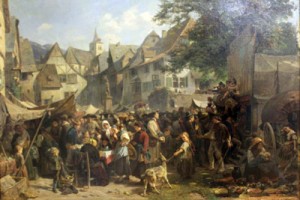
A review of Nothing is Free: The Price Only Business Leaders Can Pay to Protect Free Markets by Dave Geenens (Atchison, Kans.: Inhance Press, 2013).
* * *
Modern economics tends to reduce what happens in business to numbers and formulas. The human element is taken out, and all is left dry and lifeless. It is not without reason that economics is often called the “dismal science.”
That is why it is refreshing to read an economic book that injects the human side of things into business. Dr. Dave Geenens has done this masterfully with his book, Nothing is Free: The Price Only Business Leaders Can Pay to Protect Free Markets.
The principles he espouses are not just presented in textbook fashion. Rather, they are interwoven into a fictional story of an entrepreneur that finds herself in a dilemma over whether to put profits over principle, earnings over workers. Set in the small college town of Atchison, Kansas, where Dr. Geenens actually lives and teaches, the other protagonist in the story is a Benedictine monk from the nearby abbey. The narrative of this “free market fable” centers on the dialogue between the two main characters about work ethics and the unlikely topic of the role of God in business.
While the characters and plot of this short work are captivating, the ideas presented are much more important. Dr. Geenens makes the right connections and inserts Church teaching into the marketplace.
Thus, he concludes that money is not the bottom line in real business, but rather the human relationships that make business possible. Wealth generation is important but it only comes from proper values creation. Business may resent government intervention, but such intrusions can only be avoided by the practice of the cardinal virtues. Real business leaders are not those who increase earnings by any means, but rather those that build talent and encourage cooperation inside the enterprise.
What Does Saint Thomas Say About Immigration?
The lessons in his narrative highlight the wrong course found in so many modern economic models. In their zeal for maximum efficiency and production, many businessmen have cut themselves off from the natural restraining influence of human institutions, especially those of morals, family, community or religion. They have severed their link with Christian tradition, and have lost the anchors of the cardinal virtues that should be the foundation for any true economy.
[like url=https://www.facebook.com/ReturnToOrder.org]
The result is a society where money rules. People attach undue importance to quantity over quality, utility over beauty, and matter over spirit. Free of traditional restraints, those under this rule favor the frenetic intemperance of frantic dealings, speculation, and exaggerated risks which have sent the nation’s economy into crisis and ruin.
Something needs to be done to introduce attractive new models that run contrary to many of the business practices that now prevail. The terms of the debate need to be changed. Indeed, ever since economic thought broke free from its original moorings in moral philosophy and ethics, there have been those who have sought to keep considerations like those of Prof. Geenens out of this debate. The time has come for such reflections to return. Nothing is Free is a good start.
What does Saint Thomas Aquinas say about Marriage?
To buy the book, click here.


